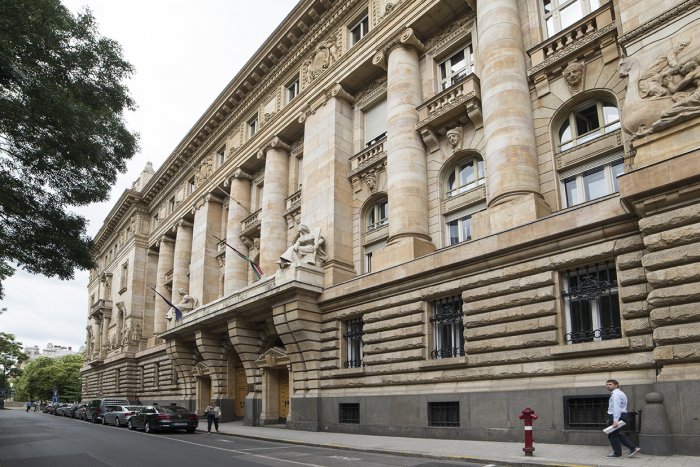MNB surprises with dovish steps, Nomura says

MNB headquarters in Budapest (Image by Jessica Fejos)
While holding the base rate intact at 0.9% yesterday, the decision by the National Bank of Hungary (MNB) to cut the top end of the band and the RRR has shown a greater degree of dovishness than expected, London-based analysts of Japanʼs Nomura said in an analysis sent to the Budapest Business Journal yesterday.
Nomura analysts see the chance of a future base rate cut “remains significant,” while they cannot rule out a further cut to the 3m depo rate in the first quarter of the year. Nomura is looking out for the reaction of BUBOR in the coming months, expecting it to fall towards 0.60-0.65%, the analysis adds.
“We saw the required reserve rate fall from 2% to 1%, which the MNB has said will liberalize HUF 170 billion into the system, which given the deposit rate cap would be lodged at the MNB at the O/N depo rate of -5 bps,” says the analysis, adding that the change is expected to take effect in December. “Also, the top end of the rates band, the O/N borrowing rate, was cut by 10 bps to 1.05%. The MNB likes the policy asymmetry idea as a tool to force BUBOR rates lower and thinks this will have a further such effect. The 15 bps gap now is probably as small as it can get without causing more problems for the banking sector,” Nomura observes.
Nomura believes the Monetary Council of the MNB wants the introduction of the new liquidity framework “to be met with a ‘bang,’ not a whimper,” observing that the maximum amount of liquidity in the system clearly helps this and should force BUBOR lower. “This is further seen by the very low offered amount in the first 3m restricted depo tender, with just HUF 150 bln given. This, remember, is what has to ‘add up’ to the HUF 900 bln cap in December (i.e. the total amount in the facility, three lots of 3m depos),” adds the analysis.
One of the reasons for such a low offer, Nomura believes, is the over-allocation that banks made in the final unrestricted tender last month. “But this is more than that, and we think is designed to force BUBOR lower faster than our initial projects, which saw it ‘glide’ down by December,” Nomura observes. “We also must consider lower FX implied rates, which have been added (to a degree, probably less than expected) by recent MNB FX tenders on various Mondays.”
Based on assumptions of Nomura analysts, a further cut is expected in the 3m depo rate in the first quarter of next year, probably of HUF 750 bln. “We think BUBOR can trade at the bottom end of the rate above – say around 0.60-0.65% through December and then, if there is a cut in the cap to around 0.50-0.55%, through the end of March,” Nomura adds.
This could mean, according to Nomura, that FRA rates are still too high by around 10 bps. “On top of this, we need to consider there is an increasing chance of a cut in the base rate, which could lower average MNB blended access rates by around 5 bps through the end of December and, in turn, put further downward pressure on BUBOR,” Nomura says. The analysis also sees the possibility of another rate cut in January, “with the MNB having more clarity on what one quarterly ‘cycle’ of the new liquidity framework looks like.”
SUPPORT THE BUDAPEST BUSINESS JOURNAL
Producing journalism that is worthy of the name is a costly business. For 27 years, the publishers, editors and reporters of the Budapest Business Journal have striven to bring you business news that works, information that you can trust, that is factual, accurate and presented without fear or favor.
Newspaper organizations across the globe have struggled to find a business model that allows them to continue to excel, without compromising their ability to perform. Most recently, some have experimented with the idea of involving their most important stakeholders, their readers.
We would like to offer that same opportunity to our readers. We would like to invite you to help us deliver the quality business journalism you require. Hit our Support the BBJ button and you can choose the how much and how often you send us your contributions.







